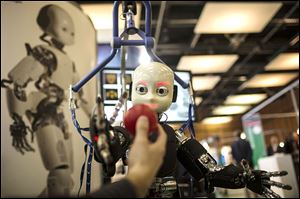
Survey: No consensus on robot’s effect on job picture
Pew study: Split views over whether robots will cause net gain or loss for jobs
8/7/2014
Respondents in a survey were split on whether robots will kill or create jobs 11 years from now.
WASHINGTON — In 2025, self-driving cars could be the norm, people could have more leisure time, and goods could become cheaper. Or there could be chronic unemployment and an even wider income gap, human interaction could become a luxury, and the wealthy could live in walled cities with robots serving as labor.
Or very little could change.
A new survey released Wednesday by the Pew Research Center’s Internet Project and Elon University’s Imagining the Internet Center found that, when asked about the impact of artificial intelligence on jobs, nearly 1,900 experts and other respondents were divided over what to expect 11 years from now.
Forty-eight percent said robots would kill more jobs than they create, and 52 percent said technology will create more jobs than it destroys.
Respondents also varied widely when asked to elaborate on their expectations of jobs in the next decade. Some said that self-driving cars would be common, eliminating taxi cab and long-haul truckers.
Some said that we should expect the wealthy to live in seclusion, using robot labor.
Others were more conservative, cautioning that technology never moves quite as fast as people expect, and humans aren’t so easily replaceable.
“We consistently underestimate the intelligence and complexity of human beings,” said Jonathan Grudin, principal researcher at Microsoft. He said he recalls that 40 years ago, people said that advances in computer-coding language were going to kill programming jobs.
Even as technology removed jobs such as secretaries and operators, it created jobs, including Web marketing, Mr. Grudin said.
Aaron Smith, a senior researcher with Pew, said the results were unusually divided.
Mr. Smith said that some respondents concluded that jobs that don’t require specifically human traits — such as empathy, ingenuity, or resourcefulness — are at risk for being replaced.
Those jobs include low-skill blue collar jobs or white-collar jobs that have people performing repetitive tasks.
Respondents offered a few theories about what might happen if artificial intelligence takes over some positions and fewer jobs are created.
Judith Donath, a fellow at Harvard’s Berkman Center for Internet and Society, said she foresees chronic mass unemployment with the wealthy living in “walled cities, with robots providing the labor.”
Some respondents see people returning to small-scale, handmade production, and an appreciation would grow for products with the “human touch.”
Others said they believe people could face abundant leisure, allowing them to pursue their personal interests.